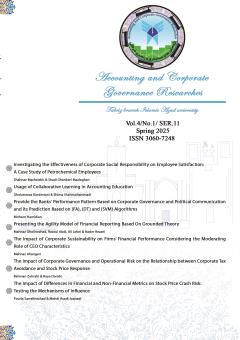Investigating the Effectiveness of Corporate Social Responsibility on Employee Satisfaction: A Case Study of Petrochemical Employees
Subject Areas : Corporate social responsibility
Shahnaz Mashayekh
1
*
,
Shadi Ghanbari Mazleghan
2
![]()
1 - Associate Prof, Department of Accounting, Faculty of Social Sciences and Economics, Alzahra University, Tehran, Iran
2 - Phd Candidate, Department of Accounting, Faculty of Social Sciences and Economics, Alzahra University, Tehran, Iran.
Keywords: Corporate Social Responsibility, Level of Employees Satisfaction, Petrochemical Employees,
Abstract :
Objective:Corporate Social Responsibility (CSR) has emerged as both a critical philosophy and a strategic approach that influences employees’ attitudes. While most CSR research has focused on the relationship between CSR activities and external customers, relatively few studies have examined the impact of CSR from employees’ perspectives. This study investigates the effect of CSR on employee engagement, satisfaction, and retention.
Method: Data were collected from 350 employees working in petrochemical companies. A questionnaire was used for data collection, and all measurement scales were adapted from previous studies. A convenience sampling method was applied, and the respondents included both managerial and non-managerial employees of petrochemical firms. Participants were asked to rate their opinions on a five-point Likert scale ranging from 1 (strongly disagree) to 5 (strongly agree). The employees were personally contacted, and the questionnaires were collected three weeks after distribution. Out of 400 questionnaires distributed, 350 valid responses were received. Data analysis was performed using SPSS. Correlation analysis was employed to examine the strength of the relationship between CSR and employee satisfaction.
Findings:The results of the correlation analysis indicated a positive and significant relationship between CSR and employee satisfaction (r = 0.754, p < 0.001). This initial relationship provided evidence supporting the research hypotheses. Furthermore, a multiple regression analysis was conducted to test the effect of CSR on employee satisfaction. The results showed that CSR has a positive and significant impact on employee satisfaction (β = 0.527, p < 0.001). The adjusted coefficient of determination (Adj-R² = 36.9%) revealed that CSR explains a substantial portion of the variance in employee satisfaction. This means that for every one-unit increase in CSR, employee satisfaction increases by 0.527.
Conclusion:These findings are highly significant for both decision-makers and researchers. They suggest that organizations can enhance employee satisfaction and retention by engaging in social activities—such as identifying and meeting community needs, contributing to environmental improvement, supporting employee welfare, producing high-quality products for customers, and adhering to ethical standards.
جعفرپور ایناللو، هومن.، نخعی، حبیب اله.، و طالب نیا، قدرت الله. (1402). بررسی تاثیر معیارهای مدیریت محیطی مسئولیت اجتماعی بر عملکرد مالی شرکت های تولیدی با تاکید بر معیارهای مالی نوین در حسابداری. دانش حسابداری و حسابرسی مدیریت، 12(47)، 323-342.
Alnehabi, M., Al-Mekhlafi, A.-B. A. (2023). The Association between Corporate Social Responsibility, Employee Performance, and Turnover Intention Moderated by Organizational Identification and Commitment. Sustainability, 15(9), 14202.
Carroll, A. B. , (1979). A Three-Dimensional Conceptual Model of Corporate Performance. Academy of Management Review, 4(4), 497-505.
Chang, C.-H., Lin, H.-W., Tsai, W.-H., Wang, W.-L., & Huang, C.-T. (2021). Employee Satisfaction, Corporate Social Responsibility and Financial Performance. Sustainabilit, 13(18), 9996.
Cherian, J., Umar, M., Thu, P. A., Nguyen-Trang, T., Sial, M. S., & Khuong, N. V. (2019). Does Corporate Social Responsibility Affect the Financial Performance of the Manufacturing Sector? Evidence from an Emerging Economy. Sustainability, 11(4), 1182.
Cho, S. J., Chung, C. Y., & Young, J. (2019). Study on the Relationship between CSR and Financial Performance. Sustainability, 11(2), 343
De Roeck, K., & Maon, F. (2018). Building the theoretical puzzle of employees’ reactions to corporate social responsibility: An integrative conceptual framework and research agenda. Journal of Business Ethics, 149, 609–625.
Hristov, I., Appolloni, A., Chirico, A., & Cheng, W. (2021). The role of the environmental dimension in the performance managementsystem: A systematic review and conceptual framework. Journal of Cleaner Production, 293, 126075.
Jafarpour Inalloo, H., Nakhaei, T., & Talebnia., Gh. (2023). Investigating the impact of social criteria on the financial performance of manufacturing companies with an emphasis on modern financial criteria. Accounting and Corporate Governance Research, 3(1), 101-126. (in Persian)
Kim, B. J., Kim, M. J., & Lee, J. (2022). The influence of corporate social responsibility on employee safety behavior: The mediating effect of psychological safety and the moderating role of authentic leadership. Front Public Health, 10, 1090404.
Kim, J. Y., Nurunnabi, M., Kim, T. H., & Jung, S. Y. (2018). The influence of corporate social responsibility on organizational commitment: The sequential mediating effect of meaningfulness of work and perceived organizational support. Sustainability, 10, 2208.
Kim, J., Cho, K., Park, & C. K. (2019). Does CSR Assurance Affect the Relationship between CSR Performance and Financial Performance?. Sustainability, 11, 5682.
Memon, A. H., Khahro, S. H., Memon, N. A., Memon, Z. A., & Mustafa, A. (2023). Relationship between Job Satisfaction and Employee Performance in the Construction Industry of Pakistan. Sustainability, 15, 8699.
Nirojan, K. (2024). Corporate Social Responsibility in the Modern World: Review. Informatics. Economy. Control - Informatics. Economics. Management, 33(1), 0201–0212.
Park, S., Kim, E. J., & Sung, M. (2017). Corporate social responsibility in Korea: How to communicate with local stakeholders. Corporate Social Responsibility and Environmental Management, 24, 634–647.
Visser, W. (2008). Corporate Social Responsibility in Developing Countries. The Oxford Handbook of Corporate Social Responsibility. 10.1093/oxfordhb/9780199211593.003.0021.
Yamane, T. (1967). Statistics: An Introductory Analysis, 2nd Edition, New York: Harper and Row. (n.d.). https://www.sciepub.com/reference/180098
Yoo, J. M., Choi, W., & Chon, M. L. (2019). Do Employees Matter in the Relationship between Corporate Social Responsibility and Financial Performance?. Sustainability, 11(22), 6251.

